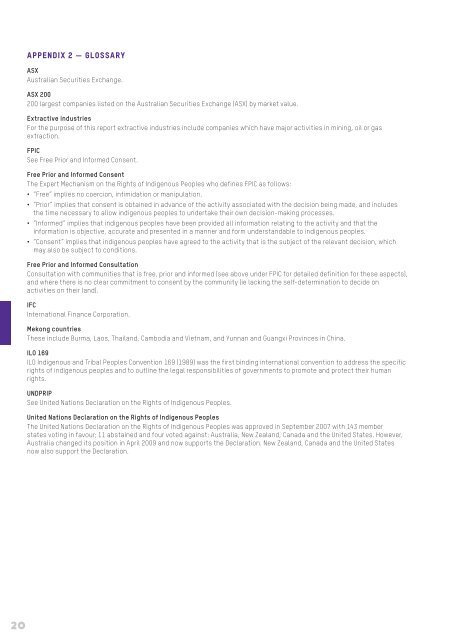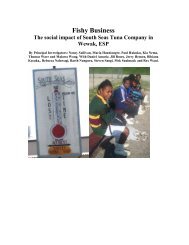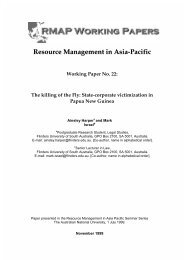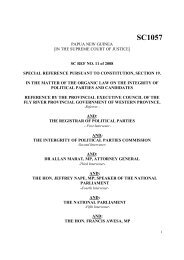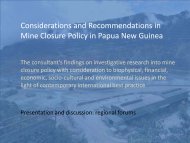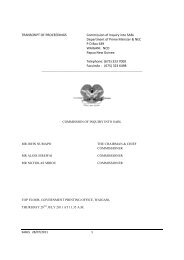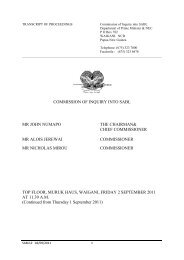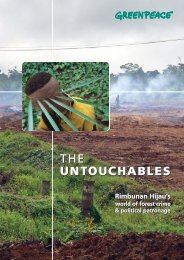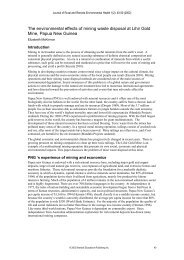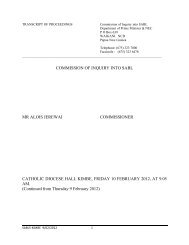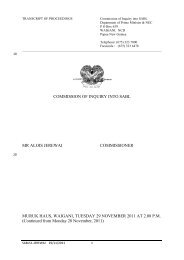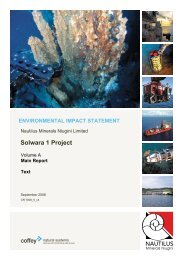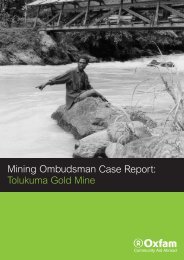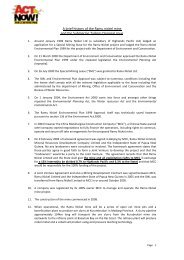Oxfam Australia and CAER: The right to decide
Oxfam Australia and CAER: The right to decide
Oxfam Australia and CAER: The right to decide
Create successful ePaper yourself
Turn your PDF publications into a flip-book with our unique Google optimized e-Paper software.
Appendix 2 — glossary<br />
ASX<br />
<strong>Australia</strong>n Securities Exchange.<br />
ASX 200<br />
200 largest companies listed on the <strong>Australia</strong>n Securities Exchange (ASX) by market value.<br />
Extractive industries<br />
For the purpose of this report extractive industries include companies which have major activities in mining, oil or gas<br />
extraction.<br />
FPIC<br />
See Free Prior <strong>and</strong> Informed Consent.<br />
Free Prior <strong>and</strong> Informed Consent<br />
<strong>The</strong> Expert Mechanism on the Rights of Indigenous Peoples who defines FPIC as follows:<br />
• “Free” implies no coercion, intimidation or manipulation.<br />
• “Prior” implies that consent is obtained in advance of the activity associated with the decision being made, <strong>and</strong> includes<br />
the time necessary <strong>to</strong> allow indigenous peoples <strong>to</strong> undertake their own decision-making processes.<br />
• “Informed” implies that indigenous peoples have been provided all information relating <strong>to</strong> the activity <strong>and</strong> that the<br />
information is objective, accurate <strong>and</strong> presented in a manner <strong>and</strong> form underst<strong>and</strong>able <strong>to</strong> indigenous peoples.<br />
• “Consent” implies that indigenous peoples have agreed <strong>to</strong> the activity that is the subject of the relevant decision, which<br />
may also be subject <strong>to</strong> conditions.<br />
Free Prior <strong>and</strong> Informed Consultation<br />
Consultation with communities that is free, prior <strong>and</strong> informed (see above under FPIC for detailed definition for these aspects),<br />
<strong>and</strong> where there is no clear commitment <strong>to</strong> consent by the community (ie lacking the self-determination <strong>to</strong> <strong>decide</strong> on<br />
activities on their l<strong>and</strong>).<br />
IFC<br />
International Finance Corporation.<br />
Mekong countries<br />
<strong>The</strong>se include Burma, Laos, Thail<strong>and</strong>, Cambodia <strong>and</strong> Vietnam, <strong>and</strong> Yunnan <strong>and</strong> Guangxi Provinces in China.<br />
ILO 169<br />
ILO Indigenous <strong>and</strong> Tribal Peoples Convention 169 (1989) was the first binding international convention <strong>to</strong> address the specific<br />
<strong>right</strong>s of indigenous peoples <strong>and</strong> <strong>to</strong> outline the legal responsibilities of governments <strong>to</strong> promote <strong>and</strong> protect their human<br />
<strong>right</strong>s.<br />
UNDPRIP<br />
See United Nations Declaration on the Rights of Indigenous Peoples.<br />
United Nations Declaration on the Rights of Indigenous Peoples<br />
<strong>The</strong> United Nations Declaration on the Rights of Indigenous Peoples was approved in September 2007 with 143 member<br />
states voting in favour; 11 abstained <strong>and</strong> four voted against: <strong>Australia</strong>, New Zeal<strong>and</strong>, Canada <strong>and</strong> the United States. However,<br />
<strong>Australia</strong> changed its position in April 2009 <strong>and</strong> now supports the Declaration. New Zeal<strong>and</strong>, Canada <strong>and</strong> the United States<br />
now also support the Declaration.<br />
20


